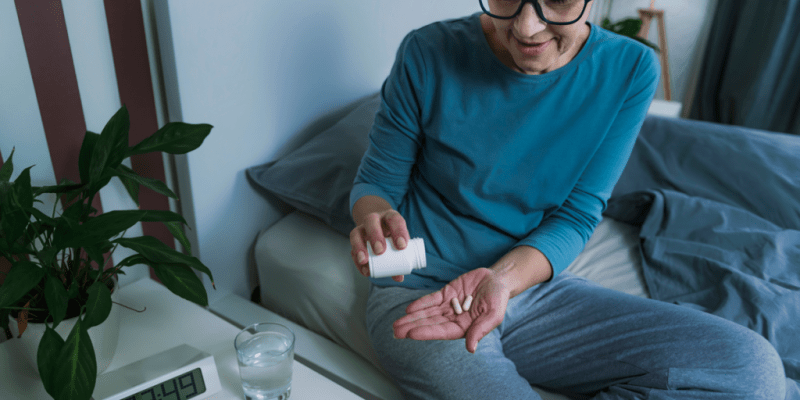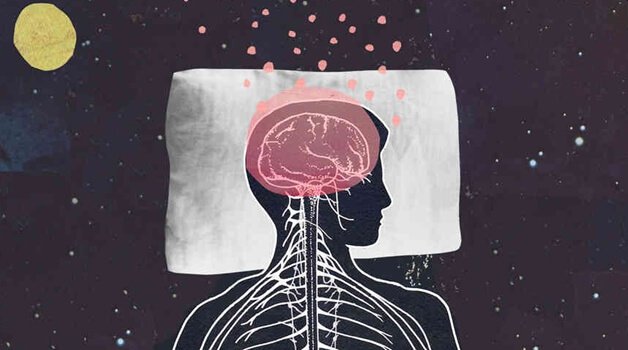Melatonin is known as the sleep hormone because it prepares your body for sleep. In fact, it’s the hormone that tells your body when to go to sleep and when to wake up.
Studies show that melatonin is safe and has fewer side effects than other sleeping pills. However, this doesn’t imply that it should be taken lightly and irresponsibly. Therefore, in this article, we’ll provide you with information about melatonin and how to take it to help you sleep.
Melatonin
Melatonin is a hormone. Its production and secretion are stimulated by fibers of the postganglionic nerve of the retina. It passes through the retinohypothalamic tract to the suprachiasmatic nucleus, then through the superior cervical ganglion until it finally reaches the pineal gland. This neuronal system is stimulated by darkness and inactivated by light (Illnait-Ferrer, 2012).
Melatonin is synthesized from the amino acid tryptophan, which is converted into serotonin. The sequential activity of the enzymes, serotonin-acetyl-transferase, and hydroxyindole-O-methyltransferase convert serotonin into melatonin.
Melatonin secretion affects the circadian rhythms. They’re controlled by an internal pacemaker located in the suprachiasmatic nucleus, which slows in the presence of ambient light (Hardeland, 1996). Melatonin enters the bloodstream by diffusion, where its concentration peaks between two and four in the morning, and then begins to decrease.
The functions of melatonin
Among the functions attributed to melatonin are the regulation of biological rhythms, neuroimmunological regulation, and modulation of the cytoskeleton and oncostatic activity, among others (Reyes-Prieto et al., 2009).
As well as synchronizing circadian rhythms, melatonin has been shown to improve sleep onset, duration, and quality (Ferracioli-Oda et al., 2013). It’s also involved in anti-oxidation, sleep regulation, and neuronal survival (Xie et al., 2017).
Several physiological effects of melatonin in different tissues have also been described. It’s even been shown to be involved in the regulation of seasonal reproduction, body weight, and energy balance (Barrenetxe et al., 2004).
Taking melatonin to help you sleep
People use melatonin primarily to help them sleep. One study claimed that taking melatonin before bed reduces sleep onset latency by nearly three minutes and increases total sleep time by approximately 30 minutes (Li et al., 2019).
In another analysis conducted on people with sleep disorders, melatonin was found to significantly reduce sleep disturbances and sleep latency, while increasing sleep duration and quality (Fatemeh et al., 2021).
Therefore, it’s evident that melatonin has a direct impact on sleep. However, how should it be taken for this purpose? Let’s take a look.
Dosage
It’s usually started in small doses, between 0.5 and one mg. Nevertheless, the dosage can be increased to three mg if its effect at lower doses isn’t significant. In this respect, it’s always important to follow the doctor’s instructions. In fact, they may suggest taking melatonin only two or three times a week, and not every night. It all depends on the patient’s particular problem, as well as other personal circumstances.
Depending on the particular sleep problem, melatonin should be taken at different times (Peters, 2021).
- Trouble falling asleep. Take 30 minutes before bedtime.
- For night owls. If you suffer from delayed sleep phase syndrome, you can take melatonin several hours before bedtime.
- For early risers. If you fall asleep really early and wake up early too, you can take melatonin close to bedtime or after a period of sleep. However, you should discuss this with a sleep specialist.
How to get the best results
When taking this hormone, care must be taken not to inhibit its effects. Therefore it’s recommended that you:
- Avoid your cellphone and other glowing tech devices in the hours before bed. That’s because light inhibits the production and secretion of melatonin.
- Turn off ceiling lights at night.
- Avoid intense physical activities just before bedtime.

Adverse effects of melatonin
Taking melatonin by mouth in appropriate amounts is generally safe. According to an investigation carried out by Besag et al. (2019), the most frequently reported adverse effects (AEs) of melatonin are:
- Daytime sleepiness (1.66%).
- Headache (0.74%).
- Other AEs related to sleep (0.74%).
- Dizziness (0.74%).
- Hypothermia (0.62%).
There were few adverse effects considered serious or clinically important reported in this study. Those mentioned were:
- Agitation.
- Fatigue.
- Changes in mood.
- Nightmares.
- Skin irritation.
- Palpitations.
Finally, we can confidently state that melatonin can help you fall asleep earlier and stay asleep longer. Although it’s available without a prescription and doesn’t cause serious side effects, we recommend that you see a sleep specialist or doctor if you have any sleep problems and want to start using melatonin. It’s not wise to self-medicate.
The post Taking Melatonin to Help You Sleep: What You Should Know appeared first on Exploring your mind.



















Comments